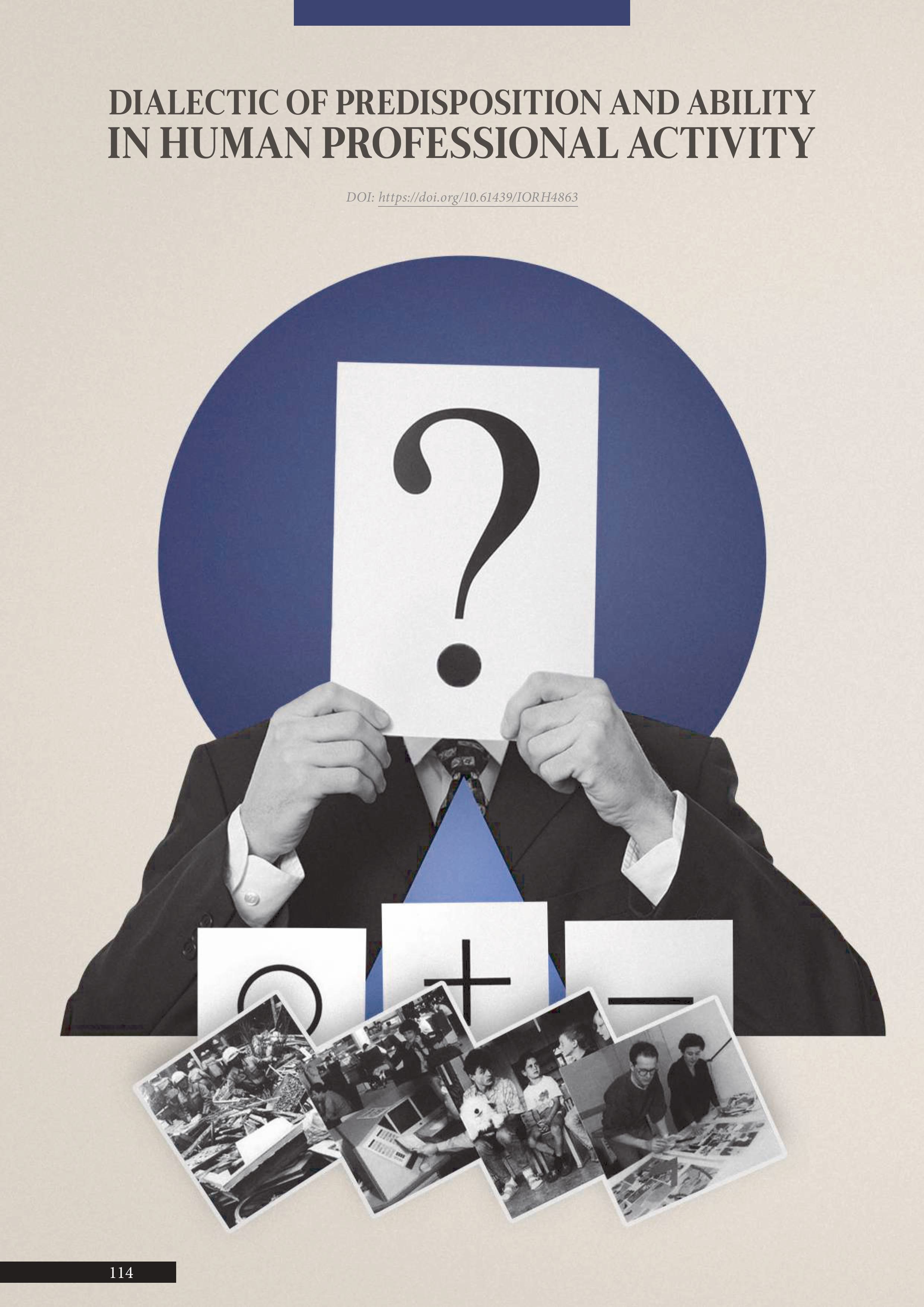Dialectic of Predisposition and Ability in Human Professional Activity
##plugins.themes.academic_pro.article.main##
Abstract
In the following scientific study, we consider a logical model, which for the first time brings us closer to the integrated perception of barriers and obstacles existing in the memory environment, "refracting" human predispositions and transforming them into skills. The area of human orientation in the world of changing opportunities, as well as in the solution of the "predisposition-ability" conflict at the stage of the formation of new professions in an intelligent society of cognitive and innovation perspective, defined by the criteria of technological development, digitalisation and transition to a virtual world of communication networks and the Internet, is justified.
From a scientific point of view, however, it is possible to grasp the characteristics of the memory environment and to search for an "exhaustive list of predispositions" as well as an "exhaustive list of characteristics of each memory environment unit". However, this usually requires years of research with a single person. From the practical point of view, this is unacceptable, because in modern circumstances such recommendations are required, which allow to predict professional activity in a few hours, and in the future to allow a person to learn to navigate independently in conditions of changes in the environment of his life and activity.
The correlation of the activity approach developments within the subject's life development, as well as the model of predisposition realisation mentioned by M. Achtnich as holistic and optimal, maintained by the specific-historical conditions of the figure, have mostly determined the key problem, to which this article is devoted.
The purpose of this scientific exploration is the philosophical understanding of predisposition and skill dialectic in human professional activity (on the example of models by Martin Achtnich and Gregory Popov).
Moreover, the tasks of academician G.Popov largely echo the original formulation of P. Drucker's smart approach, whose paradigm is now being applied to reflect on the smart approach to any areas of activity, defined by the speed of environmental change, the rapid circulation of information, and the circumstances of uncertainty. The recommendations of G.Popov, discussed in the following article, and the concept of P. Drucker do not conflict, mutually complementing each other.
DOI: https://doi.org/10.61439/IORH4863
##plugins.themes.academic_pro.article.details##
References
Achtnich, M. (1979). BBT – Berufsbilder-Test. Projektives Verfahren zur Abklärung der Berufsneigung [BBT – Berufsbilder-Test: A projective method for clarifying career inclinations.]. Hans Huber.
Achtnich, M. (1971). Schicksalsanalytisch orientierte Berufsberatung anhand des Berufsbilder-Wahltestes: Ein Beitrag zur Psychologie der Berufswahl, des Berufswechsels und der Berufsprognose. Bericht über das 5. Kolloquium der Internat. Forschungsgemeinschaft für Schicksalspsychologie. [Fate-analysis-oriented career counseling based on the Berufsbilder-Wahltest: A contribution to the psychology of career choice, career change, and career prognosis. Report on the 5th Colloquium of the International Research Community for Fate Psychology.] Hans Huber.
Bell, D. (1976). The coming of post-industrial society: A venture in social forecasting. Penguin & Co.
Borisova, G. (2007). Social destruction as a universal phenomenon of society life: Frankfurt School position. Bulletin of Nizhegorodskiy University by N. Lobachevskiy. Social Studies. Retrieved from https://cyberleninka.ru/article/n/sotsialnaya-destruktsiya-kak-universalnyy-fenomen-zhizni-obschestva-pozitsiya-frankfurtskoy-shkoly-2
Fromm, E. (2010). Beyond the chains of illusion: My encounter with Marx and Freud (Original work published 1962). AST.
Horkheimer, M., & Adorno, T. W. (1997). Dialectic of enlightenment: Philosophical fragments. Medium, Yuventa.
Kantor, K. M. (2009). Logical sociology of Alexander Zinoviev as social philosophy. In Alexander Zinoviev (pp. 385). ROSSPEN.
Karmanov, A. M. (2014). Smart as the new post-information society development degree. Economics, Statistics and Informatics, (5), 38–41.
Critical sociology of Frankfurt School. (2007). Bulletin of the Russian University of Friendship of Peoples: Sociology, (3), 52–67. Retrieved from https://cyberleninka.ru/article/n/kriticheskaya-sotsiologiya-frankfurtskoy-shkoly
Maksimenyuk, M. Y. (2016). Informatively-communicative society as a variety of complex social structures and cooperation. In V. O. Nikitenko (Ed.), Humanitarian Bulletin of the Zaporizhzhya State Engineering Academy: Scientific Collection, 66, pp. 266–278.
Marcuse, G. (1994). One-dimensional person. Refl-book.
Pollock, F. (1923). Zur Geldtheorie von Karl Marx [Inaugural dissertation, Wirtschafts- und Sozialwissenschaftliche Fakultät der Universität Frankfurt am Main, manuscript]. Reprinted in Wien, 2018, pp. 23–127.
Popov, G. S. (1951). Phenomenology of memory: Basic methodological approaches to human memory research [Manuscript]. Archive "NII Pamyati". (Fond "Nasledie akademika G. Popova," Vienna, 1940), F. 3, Des. 2, D. 1, Fp. 1–6, pp. 41–50.
Schmidt, A. (1981). Kritische Theorie, Humanismus, Aufklärung: Philosophische Arbeiten. Reclam.
Silberman, M., & Hansburg, F. (2000). People smart: Developing your interpersonal intelligence. Berrett-Koehler Publishers.
Skovoroda, H. (2016). Hryhorii Skovoroda (2nd ed., revised and reprinted, L. Ushkalov, Ed.). Savchuk O. O.
Soboleva, M. (2002). To the conception of the philosophy of language of Jürgen Habermas. Logos.
Szondi, L. (1956). Ich-Analyse: Die Grundlage zur Vereinigung der Tiefenpsychologie, Teil 1. Hans Huber.
Voronkova, V., Kivlyuk, O., & Andryukajtene, R. (2018). Anthropological measuring of smart-society: Theory and concept experience. The Humanitarian Bulletin of ZSIA (73), 25–40. Retrieved from http://www.zgia.zp.ua/gazeta/gvzdia_73_25.pdf
Yudin, A. (1995). The paradoxes of the Great Refuse. In G. Marcuse, About Eros and civilization: Philosophical research of Freud’s studies (pp. 275). Kyiv.

